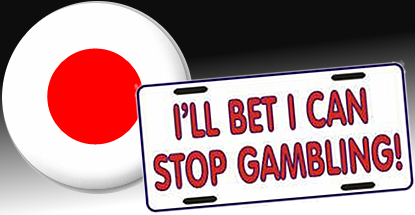 Supporters of Japan’s push to legalize casino gambling took a collective kick to the groin this week after government researchers released a report claiming the rate of the country’s gambling addicts was already five times higher than other countries. The Health, Labor and Welfare Ministry claims some 5.4m Japanese adults, roughly 5% of the adult population, are addicted to gambling.
Supporters of Japan’s push to legalize casino gambling took a collective kick to the groin this week after government researchers released a report claiming the rate of the country’s gambling addicts was already five times higher than other countries. The Health, Labor and Welfare Ministry claims some 5.4m Japanese adults, roughly 5% of the adult population, are addicted to gambling.
Addiction researcher Susumu Higuchi says the figure compares unfavorably with rates in other developed countries, which he claimed hover around the 1% mark. While that’s true for the numbers of pathological gamblers, the ranks of those who demonstrate less severe problem gambling behavior can range as high as 5%, leaving open the possibility that the survey’s figures are entirely in line with international norms. Then again, the same Japanese survey also claimed over 4m Japanese citizens were ‘addicted’ to the internet, so the devil’s in the definitions.
The results came from a July 2013 survey of over 4k randomly chosen Japanese adults. Extrapolating from the sample, Higuchi told the Kyodo news agency that around 4.4m men (8.7% of the population) and 980k women (1.8%) are believed to be struggling with gambling addiction. Higuchi said the results proved that “the development of a treatment environment is swiftly needed” and that legislators may wish to reconsider their casino plans. But legislators would do well to consult similar research in Singapore, which found that local rates of gambling addiction were unaffected by the introduction of the city-state’s two integrated resort casinos in 2010.
While legislators are expected to pass their casino study bill sometime in the fall session of the Diet, the survey is raw meat to anti-casino activists. Japan currently allows betting on racing (horse, bicycle, motorcycle and motorboat) as well as the pseudo gambling available in Japan’s ubiquitous pachinko parlors.
Ah, yes… Pachinko. With 12k parlors offering the pinball-style game nationwide, the industry is still staggeringly vast but it’s facing the same kind of existential crisis as the slots-focused US casino industry: their players are dying. Dynam Japan Holdings, which operates 371 pachinko parlors, says more than half of its customers are over 50 years old, while just 9% are under 30.
Morgan Stanley says the pachinko industry generates annual revenue of ¥19t (US $185b) but that’s down from ¥31t two decades ago. Downturns in the overall Japanese economy haven’t helped, but the main problem is an inability to encourage younger players – who prefer gaming on their phones – to park their butts in a pachinko seat. The high-profile headlines generated by Japan’s new gambling survey likely won’t help boost pachinko’s image.
